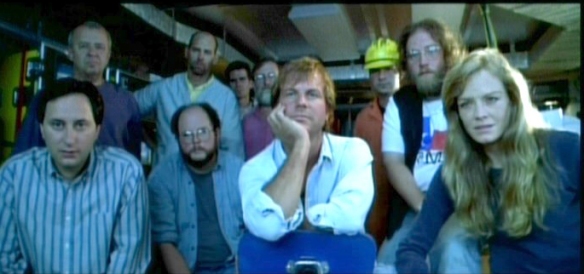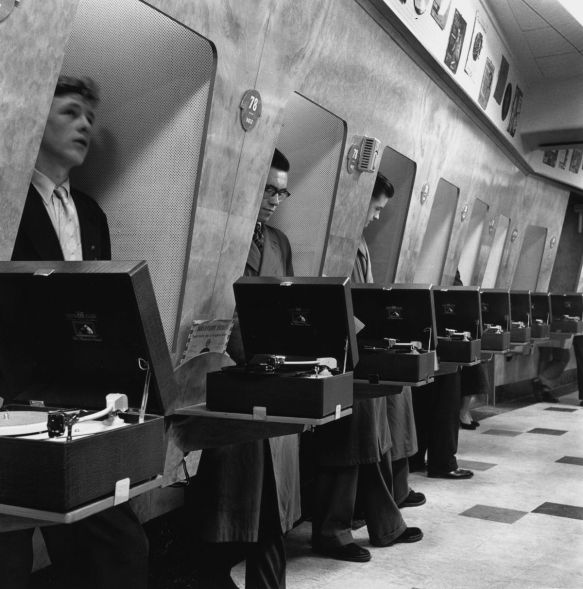
Why did I put myself through the emotional upheaval of watching Titanic last night? What compelled me to sit through 194 minutes of tragic romance (the love story) and romanticized tragedy (everything else happening with the sinking ship)? No one agrees to do such a thing in the year 2017 without knowing how the film ends – knowing that the ship is doomed, knowing how the tale of Jack and Rose concludes – yet I chose to watch anyway. Beginning to end, all the way through; I don’t know if I had ever actually done that, although I had certainly seen numerous famous scenes before, especially in the last third of the film.
For the last week and a half I’ve been doing a movie and TV marathon. I’m watching every project with Bill Paxton that I can find. That means Apollo 13, the new “Training Day” series on CBS, even the somewhat obscure thriller Trespass. (I also watched True Lies again, a movie that I don’t especially care for, what with all the sexism, racism and other stereotypes played for guffaws. Paxton’s performance is fabulous, though, playing a used car salesman so skeevy that it makes complete sense when we hear him blasting the Bee Gees’ “More Than a Woman” on his convertible’s stereo. Wonderful song, but it has the capacity to appear oddly sleazeball-friendly in the wrong context.) (Also, I linked to the video above in a post last week, but here it is again in case you missed it – and it’s funny enough to deserve repeat viewings.) When an actor or musician passes away – David Bowie last year, for example – it is a comfort to me if I am already familiar with a great deal of the person’s work. It makes a difference to have appreciated someone when he was around, you know? But when a performer dies and I wasn’t nearly as well-versed in his oeuvre as I feel I ought to have been, the sadness is exponentially more profound.
Considering the dozen or so times I’ve enjoyed Twister (as seen above) since childhood, it doesn’t make sense why I didn’t follow up with more than a handful of other Bill Paxton movies. Not Weird Science or A Simple Plan or Frailty, not even Aliens (despite how much I love its predecessor, Alien). There is always something so bittersweet about not really discovering an artist’s legacy until after the fact – now every cinematic experience, even silly old True Lies, is tinged with posthumous poignancy.
So again I ask myself: why watch Titanic? Why put myself through the wringer? It’s such a ridiculous, overrated film in many respects. I had forgotten how atrocious the dialogue is (“Jack!” “Rose!” “Where are you, Jack?” “I’m here, Rose!” “Oh, Jack!” etc.) and that many of the supporting actors don’t get enough screen time (even in a three-hour movie) because Leonardo DiCaprio and Kate Winslet so thoroughly dominate the story being told. But the point of watching Titanic wasn’t just to roll my eyes at the cheesiness. There is undeniable catharsis in watching a film that is guaranteed to produce buckets of tears, like you can feel OK about the overwhelming sorrow because millions of moviegoers felt it too.
Titanic is a great – or maybe I need to rephrase: important – experience, not because of the quality of the filmmaking but because of the scope of the piece. The masses have always loved disaster films (again: see my love for Twister) and this particular film is one of the most epic of its kind; it’s a spectacle on the grandest scale imaginable. Say what you will about the excessive CGI special effects, but 70s-tastic dramas like The Poseidon Adventure sure don’t come close to James Cameron’s vision of the mighty Titanic foundering at sea in 1912.
So just how does Bill Paxton fit into this discussion of Titanic anyway? He plays Brock Lovett, the treasure hunter whose search for the fabled “Heart of the Ocean” necklace, which was supposedly on board the ship when it sank, leads Old Rose (dear Gloria Stuart!) to him. Paxton has the first and last lines of the movie, a small details that I hadn’t remembered or realized. I also forgot/maybe never knew that his character flaunts a cringeworthy, dirty-blonde almost-mullet, a piratical earring which obviously James Cameron thought was another super cool sartorial choice back in 1997, and a sweater probably plucked from an L.L. Bean winter catalog. But even with that aesthetic hodgepodge, and as jerky as Paxton’s character is during the first twenty minutes, the actor was such a professional that he made me care about the performance. Paxton is barely in the film, but as his name flashed by in the end credits and Céline Dion’s trembling vocals murmured the early verses of “My Heart Will Go On,” I wept even more; the emotion of the film met the emotion of real life. In this type of situation, the rivers of tears are a help, or if not “help,” at least a way of dealing with the thought of the random cruelty of life. The song plays on.
When an actor’s death affects me so strongly, I don’t just think of him as a celebrity, reduced to an image on a screen. Actors are human beings – a radical revelation, I know – but ever since the age of movie-fan magazines in the 1920s and 30s, there has been a tendency for actors to be thought of as mythical, deified, existing on a separate plane from us commoners. It is impossible for me not to mourn the loss of Bill Paxton, an actor who so many people (whether they worked with him or met him for only a moment) agree was a “nice guy,” and who, in a just world, would still be here to play those strange and intriguing supporting roles that lie slightly outside the realm of glamorous stardom. When I watch “Training Day” each week, I remember what I wrote in my notes after trying the pilot episode (I often scribble stray observations during commercial breaks): “Bill Paxton narrates like he’s a world-weary private eye in a film noir. Or maybe his voice is the sound of an old pair of cowboy boots walking across hot sand. Either way, a protagonist who isn’t Brad Pitt, not bionic Tom Cruise – he’s a man who you could believe has arthritis.” This show, Titanic, and the rest of the marathon: they all form a part of my grieving process for an artist who I have only just begun to appreciate. Cause-and-effect in reverse, you might say.


